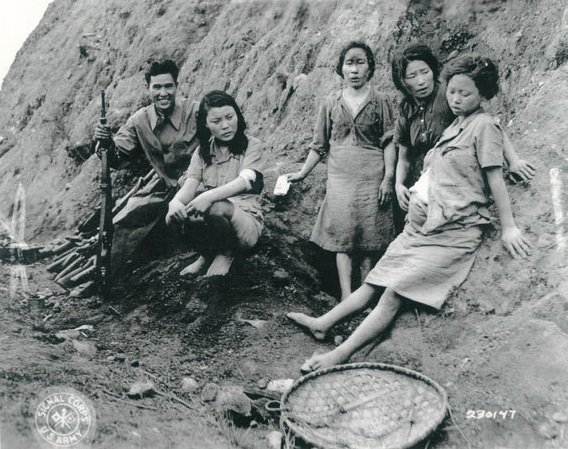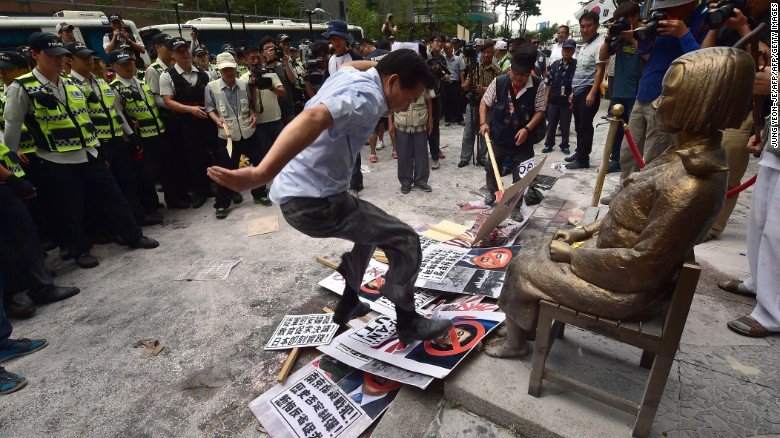As a global society, each and every one of us are part of countries and communities that are incredible in their own right but are by no means perfect. Civilization has taken a long winding journey filled with triumph and tragedy to get the modern world we have today. We take great effort in order to learn from our historical mistakes and misalignments to inform our future growth. And yet, there are traumas of history that aren't easy to shake off or glaze over in our textbooks. Some need more actionable approaches and can't be left for time to heal.
In South Korea, one issue that has flared up more recently in international press and has yet to find a mutual conclusion is the issue of 'Comfort Women' – women who were coerced or tricked into sexual slavery during the early-mid 1900s when Japan still occupied countries including Korea, China, and Taiwan. Recent findings in early-century documents have re-highlighted the depth of this transgression by the Japanese Government at the time. This, coupled with the fact that so many former comfort women still live today, has brought in the debate of how exactly to approach or even deal with the issue in the modern day.

Source: Media Today
Today, I'll review the contemporary status of the issue and explain how one member of the KR community is trying to address it. As always with Lost in Translation posts, I'll be contributing all SBD made from these posts to the featured author.
To Memorialize or To Forget? The Conundrum Today
In the past decade, many new findings have emerged that describe and document the extent of the comfort women system perpetrated by the Japanese government in the mid-1900s. This has caused great strain between several asian countries previously occupied and the current Japanese administration. Reparations have been divvied out and formal apologies made, but many protest that it hasn't been enough to make up for the estimated several hundreds of thousands of victims, many of whom are still alive today.
The main points of contention seem to be as follows -
How to teach this subject.
A main point of contention within Korean society is how to talk about this subject. On one side, many fear that successive generations will come to forget these victims. On the other, many are against holding such painful memory as a part of the nation's narrative. This debate is more pointed to the public school system.
How to memorialize these women.
The first point compounds in this one as governments try to figure out where and how is best to give respect to so many victims. The traditional method of memorializing historical figures in bronze and iron statues evidently does not apply here. San Francisco's decision to display a statue of three young girls, one each from Korea, China, and the Philippines, touched on this nerve once again, causing strained outcries from Japan.

Source: Blox Images
How to maintain what social relationship with Japan.
All of the potential “solutions” for dealing with this issue bump up against the biggest cause of distress – Japan's continued involvement in how this issue is resolved. Since this is still technically a living tragedy, it's hard to argue that this is no longer a relevant issue. On the other hand, the majority of the Japanese public has no direct experience or affiliation. So what to do?

Source: CNN
If you're interested in learning more of the topic and recent developments, I recommend starting with these reports by Al Jazeera, NPR, and CNN.
@leemikyung and Her Social Fundraising
Last month, the KR community supported the first instance of an all-women Meetup in Seoul, South Korea. We all know that the internet is not always the most equitable place and Steemit has proven to be the more accepting and encouraging of most social media sites. Especially in a country where women are set in such drastically different roles professionally and socially, it's exciting to see real mobilization to nurture this part of the community.
!
Female Steemian Meet Up, Seoul | Source: @leemikyung's post
It looked like great fun, judging by the numerous posts for example by @manizu and @siritable and I'm sure there will be more. But what really took me by surprise was the collective effort by @leemikyung. They collectively agreed to donate all the payouts from their Meetup posts to the cause of comfort women.
Beyond this particular instance of actionable charity, @leemikyung is professionally and personally committed to supporting diverse forms of development in the region. She hosts startup workshops and incubation programs in Southeast Asia. Many of these are focused on supporting entrepreneurial efforts by young professionals, including English lessons, cultural exchanges, and overall mentoring. Here's one example of her work in Cambodia.
Be sure to follow her work and show your support. Thanks for reading!
이번 Lost In Translation 글에서는 위안부에 관련한 역사적 사실과 최근 샌프란 시스코에 설치된 위안부 정의연합의 세 나라의 소녀 동상에 관한 내용을 쓰게 되었습니다. 그 동기는 최근 여성 스티미언 밋업의 수익금을 단체에 기부하신 사실을 보며 받게 되었습니다.
우리가 사회를 위해 함께 이런 방법으로도 참여할 수 있다
그리고 항상 사회적 이슈에 관심을 가지시고 스팀에 스토리를 공유해주시는 @leemikyung님의 재밌는 다문화 이야기, 남 아시아에서의 창업을 돕는 이야기를 잘 보고 있습니다.
Lost In Translation은 앞으로 스팀KR에서 있는 다양한 프로젝트와 그것을 리드하는 유져들의 소개글을 중심으로 글을 써보려고 합니다. 이 글의 수익금은 다음 밋업이나 프로젝트에 쓰일 수 있게 작가님들께 보내드립니다. 이번 글의 수익금은 앞으로 여성 밋업이나 사회 기부에 쓰일 수 있게 @leemikyung 님께 보내드리겠습니다. 고맙습니다
Landing Image Thanks to Talented @soyo of soyo art gallery
Avatars Thanks to KR's Stellar @tonesquare


